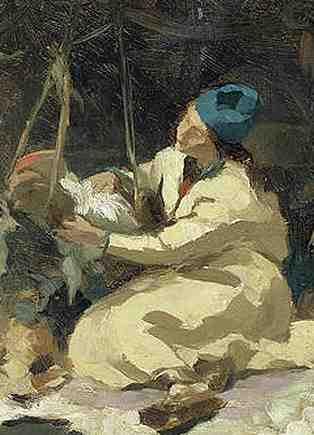The beautiful 'Cossack Lullaby' was composed by Mikhail Lermontov in 1838, when he was first stationed in the Caucasus. It's a cradle song, popular among translators, but causing difficulties because its short 4/3 stanzas are tightly rhymed.

Lermontov reputedly heard a Cossack woman singing
to her baby in a village close to where he was stationed during the war that was claiming heavy casualties to Russian troops. Lermontov
put his own words to the lullaby, but it accurately reflects a Cossack's continual need to protect his land from Chechen raids.
Каза́чья колыбе́льная пе́сня
Спи, младенец мой прекрасный,
Баюшки-баю.
Тихо смотрит месяц ясный
В колыбель твою.
Стану сказывать я сказки,
Песенку спою;
Ты ж дремли, закрывши глазки,
Баюшки-баю.
По камням струится Терек,
Плещет мутный вал;
Злой чечен ползет на берег,
Точит свой кинжал;
Но отец твой старый воин,
Закален в бою:
Спи, малютка, будь спокоен,
Баюшки-баю.
Сам узнаешь, будет время,
Бранное житье;
Смело вденешь ногу в стремя
И возьмешь ружье.
Я седельце боевое
Шелком разошью…
Спи, дитя мое родное,
Баюшки-баю.
Богатырь ты будешь с виду
И казак душой.
Провожать тебя я выйду —
Ты махнешь рукой…
Сколько горьких слез украдкой
Я в ту ночь пролью!..
Спи, мой ангел, тихо, сладко,
Баюшки-баю.
Стану я тоской томиться,
Безутешно ждать;
Стану целый день молиться,
По ночам гадать;
Стану думать, что скучаешь
Ты в чужом краю…
Спи ж, пока забот не знаешь,
Баюшки-баю.
Дам тебе я на дорогу
Образок святой:
Ты его, моляся богу,
Ставь перед собой;
Да, готовясь в бой опасный,
Помни мать свою…
Спи, младенец мой прекрасный,
Баюшки-баю.
The TTS (text to speech) recording of the first three stanzas:
The poem is in tightly-rhymed iambic stanzas: the first two are:
Спи, младе́нец мой прекра́сный, 4A
Баюшки-баю́. 3b
Ти́хо смо́трит ме́сяц я́сный 4A
В колыбе́ль твою́. 3b
Ста́ну ска́зывать я ска́зки, 4A
Пе́сенку спою́; 3b
Ты ж дремли́, закры́вши гла́зки, 4A
Баюшки-баю́. 3b
По камня́м струи́тся Те́рек, 4A
Пле́щет му́тный вал; 3b
Злой чече́н ползёт на бе́рег, 4A
То́чит свой кинжа́л; 3b
Но оте́ц твой ста́рый во́ин, 4C
Закалён в бою́: 3d
Спи, малю́тка, будь споко́ен,4C
Баюшки-баю́. 3d
Lermontov's Cossack Lullaby has been widely translated, often with contrived rhymes or no rhymes at all, but the best rendering known to me is that of
C.M. Bowra. I give his first two stanzas:
Softly, pretty baby, sleeping,
Bayushki-bayu,
Quiet moon bright watch is keeping
On your crib for you.
I shall tell you tales past number.
Sing you ditties too.
Close your tender eyes in slumber,
Bayushki-bayu
Terek on his stones is fretting
With a troubled roar ;
Wild Chechen, his dagger whetting,
Crawls along the shore.
But your father knows war’s riot,
Knows what he must do.
Sleep, my darling, sleep in quiet,
Bayushki-bayu
There are two points of interest: how we deal with the tight rhyming, and how we translate Баюшки-баю́.
Each stanza has its own problems, of course, but with the literal:
4. You'll look like a hero
and a Cossack soul.
I 'll come out to see you off —
you'll wave your hand…
One solution is use the 'cheer you' as an approximate rhyme for 'hero'. It's a practice not to be overdone, but does preserve the feminine rhyme needed for
the music of the piece.
4. You’ll be the fine, young hero,
Cossack to the core,
I’ll be the one to cheer you
going off to war.
Баюшки-баю́ literally means 'I tell a story' but is used by Cossacks for 'lullaby'. Bowra reproduces the Russian with 'Bayushki-bayu', but
a more beautiful expedient is the English-Russian composite 'lullaby-bayu', with the accent on the final 'u'.
The translation of the Cossack Lullaby is then:
1. Stay, my beautiful, still sleeping.
lullaby-bayu.
On your cot the moon is keeping
silent watch for you.
Tales I’ll tell you, any number,
with a song or two.
Close your little eyes and slumber,
lullaby-bayu.
2. Though the bouldery Terek river
plunges into shade:
and wicked Chechen’s creeping hither
with his whetted blade,
your father is a fighter, fearless,
long battles undergone.
So have no fears of that, my dearest:
sleep, my little son.
3. You’ll find in time that’s ever nearing,
what soldiering has won.
You’ll mount your horse, and not be fearing
to brandish high your gun.
And what I stitch in silk may be
the saddle cloth for you.
So sleep my little darling baby,
lullaby-bayu.
4. You’ll be the fine, young hero,
Cossack to the core,
Mine the task to wave and cheer you,
going off to war.
But many tears I will be weeping
throughout the night for you.
Sleep, my angel, soft be sleeping:
lullaby-bayu.
5. I long and knowingly will languish,
and wait the whole day through.
I’ll look the whole night long in anguish
what future comes to you.
In a foreign land I see you fretting
at what you there must do:
sleep: these cares you're now forgetting:
lullaby-bayu.
6. A holy icon I will give you
for the journey out,
and when you pray that God be with you
and the fight’s in doubt,
you’ll place it in your own sight keeping,
and think of mother too:
stay, my beautiful, still sleeping
lullaby-bayu.
1. Mirsky, D.S. A History of Russian Literature (Knopf 1926/Vintage 1958) 136-44.
2. Bristol, E. A. History of Russian Poetry (OUP 1991) 129-33.
3. Britannica entry.
Russian poem translations on this site: listing.